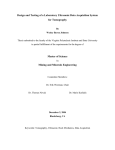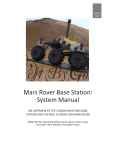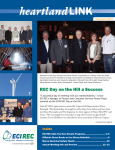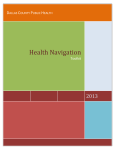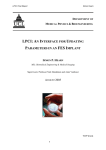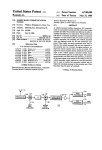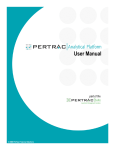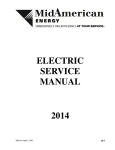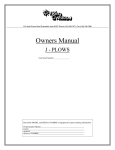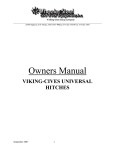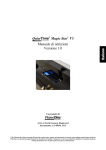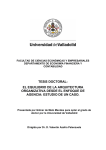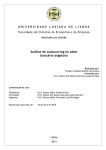Download gas service manual - MidAmerican Energy
Transcript
GAS SERVICE MANUAL 2008 64-20 1/31/08 If you smell gas, contact MidAmerican Energy at: 1-800-595-5325 Effective: January 31, 2008 If you smell gas, contact MidAmerican Energy at: 1-800-595-5325 Effective: January 31, 2008 GAS SERVICE MANUAL INTRODUCTION ……………………………………………………………………… 1 1.0 SAFETY ………………………………………………………………………... 1.1 SAFETY OF CUSTOMER EQUIPMENT ……………………………………… 4 1.2 PROTECTION OF MIDAMERICAN FACILITIES ……………………………. 7 2.0 AVAILABILITY AND CHARACTERISTICS OF SERVICE …….……….…. 10 3.0 OBTAINING GAS SERVICE ………………………………………………….. 12 4.0 REQUIREMENTS FOR SERVICE INSTALLATION …………...…………… 16 5.0 REQUIREMENTS FOR GAS METER SETS ………………………………….. 18 6.0 MANUFACTURED HOMES …………………………………………………… 20 7.0 RELOCATION OF COMPANY GAS FACILITIES …………………………… 22 8.0 DIVERSION OF SERVICE OR TAMPERING ……………………………….. 23 If you smell gas, contact MidAmerican Energy at: 1-800-595-5325 3 Effective: January 31, 2008 LIST OF FIGURES Figure Page 1 Preferred Location of Gas Meter Set …………………..………….…………... 26 2 Clearance Zone Requirements from Vents and Air Intakes …….…...……...… 27 3 Clearance Zone Requirements from Doors and Windows ….…………..……... 28 4 Clearance Zone Requirements from Electrical Equipment …………..………... 29 5 Clearance Zone Requirements from Electric Meter Socket ……….…………... 30 6 Typical Residential Meter Set …….………...………………………………... 31 7 Alternate Residential Meter Set for Flexible Customer Piping ………...……... 32 8 Alternate Residential Meter Set for Manufactured Homes ……………………. 33 9 Typical 2-Meter Manifold …………………………………………………….. 34 10 Typical 4-Meter Manifold …………………………………………………….. 35 11 Typical 8-Meter Manifold ……………………………………………………... 36 12 Typical 10-Meter Manifold ……………………………………………………. 37 13 Typical 12-Meter Manifold ……………………………………………………. 38 14 Typical Meter Set for Loads of 300 to 800 CFH ……………………………… 39 15 Typical Meter Set for Loads of 800 to 1,500 CFH ……………………………. 40 16 Typical Meter Set for Loads of 1,500 to 3,000 CFH ………………………….. 41 17 Typical Meter Set for Loads of 3,500 to 7,000 CFH ………………………….. 42 18 Typical Meter Set for Loads of 7,500 to 16,000 CFH ………………………… 43 19 Meter Barricade Requirements ………………………...……………………… 44 If you smell gas, contact MidAmerican Energy at: 1-800-595-5325 Effective: January 31, 2008 LIST OF APPENDICIES Appendix A B Page Facility Agreement Forms • Gas/Electric Service Facility Application Agreement .…………………. • Gas Service Facility Application Agreement .……….………………….. 48 • South Dakota Gas Facility Agreement .………………..……………….. 50 Customer Authorization Form ………..……………………………………. If you smell gas, contact MidAmerican Energy at: 1-800-595-5325 46 52 Effective: January 31, 2008 COMMUNITIES SERVED IOWA Adel Afton Agency Akron Algona Alleman Allison Alton Altoona Alvord Ankeny Aplington Archer Arthur Atalissa Atkins Attica Audubon Aurelia Avoca Avon Lake Badger Bagley Barnes City Battle Creek Bayard Beacon Berwick Bettendorf Blue Grass Bondurant Bouton Boyden Brayton Bristow Buffalo Bussey Callender Calumet Capitol Heights Carlisle Carney Carson Cedar Cedar Rapids Chapin Charles City Clarion Clarksville Cleghorn Clive Coalville Colfax Coralville Cumming Cylinder Dakota City Dallas Center Danbury Davenport Defiance Denmark Denver Des Moines DeSoto Dewar Dexter Donnellson Doon Dumont Duncombe Dunkerton Dunlap Durant Eagle Grove Earlham Earling Early Eddyville Eldridge Elk Horn Elk Run Heights Elkhart Elliott Ely Emerson Essex Evansdale Exira Fairfax Farragut Fenton Floyd Fort Dodge Fort Madison Fremont Galva Germantown Gilbertville Goldfield Granville Grimes Griswold Hamilton Hamlin Hampton Hancock Hartford Harvey Hedrick Henderson Hiawatha Hills Hinton Holstein Hospers Hudson Hull Humboldt Ida Grove Independence Indianola Inwood Iowa City Irwin Jamaica James Janesville Jesup Johnston Keomah Village Kesley Kimballton Kinglsey Lake City Larrabee Latimer Lawton LeClaire Leighton LeMars Linden Logan Lohrville Lone Rock Long Grove Lovilia Lytton Macedonia Malvern Manson Mapleton Marcus Marion Marne Martensdale Melcher-Dallas Meriden Merrill If you smell gas, contact MidAmerican Energy at: 1-800-595-5325 Milo Minburn Minden Mineola Mingo Missouri Valley Mitchellville Monroe Montpelier Moorland Moscow Moville Nashua Neola New Hartford New Sharon Newell Newkirk North Liberty Norwalk Oakland Odebolt Oskaloosa Otho Ottumwa Oxford Pacific Junction Panora Panorama Park Park View Parkersburg Perry Pershing Persia Plainfield Pleasant Hill Pleasant Valley Pleasantville Polk City Portsmouth Prairie City Princeton Raymond Red Oak Redfield Ringstead Rising Sun Riverdale Riverside Robins Rock Valley Rockwell Rockwell City Runnels Ruthven Salix Saylorville Schaller Sergeant Bluff Sheffield Shelby Sheldon Shell Rock Shenandoah Shueyville Silver City Sioux City Sloan Solon Spring Hill Stanton St. Charles St. Marys Stuart Sutherland Swisher Thor Tiffin Tracy Treynor Twin Lakes Underwood University Heights University Park Urbandale Van Meter Walcott Walnut Washburn Waterloo Waverly Wesley West Des Moines West Liberty West Point Wever Whiting Wilton Windsor Heights Winterset Yale Effective: January 31, 2008 COMMUNITIES SERVED ILLINOIS SOUTH DAKOTA NEBRASKA Andalusia Barstow Campbells Island Carbon Cliff Cleveland Coal Valley Colona Cordova Coyne Center East Moline Edgington Green River Hampton Hillsdale Illinois City Joslin Milan Moline Oak Grove Orion Osborn Port Byron Rapids City Rock Island Silvis Taylor Ridge Alcester Baltic Beresford Brandon Canton Centerville Colton Corson Dakota Dunes Dell Rapids Elk Point Ellis Flandreau Gayville Harrisburg Hartford Jefferson Lennox McCook Lake Meckling Montrose North Sioux City Ramona Salem Sioux Falls Tea Valley Springs Vermillion Worthing Yankton South Sioux City Dakota City Dakota County If you smell gas, contact MidAmerican Energy at: 1-800-595-5325 Effective: January 31, 2008 THIS PAGE INTENTIONALLY LEFT BLANK If you smell gas, contact MidAmerican Energy at: 1-800-595-5325 Effective: January 31, 2008 GAS SERVICE MANUAL INTRODUCTION Purpose The purpose of this manual is to supply essential information regarding gas installations of MidAmerican Energy Company (MidAmerican Energy or Company) to: • • • • • • Customers Customer’s representatives Employees Architects Engineers Contractors It is the Company’s objective to cooperate with and assist customers in obtaining safe, efficient gas service. The Company’s facilities will be constructed, installed, maintained and operated in accordance with applicable codes and accepted good engineering practice in the gas industry to ensure, as far as reasonably possible, continuity of service, uniformity in the quality of the service furnished, and the safety of persons and property. Code Compliance Information contained within this manual shall not be construed to relieve or lessen the responsibility of the customer or customer’s representative from complying with all applicable codes, rules and regulations. Company Liability Consistent with the Company’s tariff, no inspection by the Company or failure to object to the customer’s installation shall render the Company liable for injury or damage resulting from any defective or deficient installation by the customer. If you smell gas, contact MidAmerican Energy at: 1-800-595-5325 1 Effective: January 31, 2008 INTRODUCTION, Continued The information in this manual is based upon management-approved Safety Codes and Regulations interpretation of the intended safe and practical application of the following: • National Fuel Gas Code (NFPA 54/ANSI Z223.1, latest issue) • NFPA 501A Standard for Fire Safety Criteria for Manufactured Home • • • • Installations, Sites, and Communities Uniform Mechanical Code Pipeline Safety Regulations CFR 49 Part 192 Regulations of the governing state’s utilities commission/board MidAmerican Energy Company tariffs Local governing authorities may impose more stringent requirements than shown in this manual. All installations shall meet these requirements for design, construction, materials, and maintenance of natural gas fuel piping systems, equipment and related accessories. Manual Does Not Cover This manual does not cover gas utility installations that are under the exclusive control of the Company for the purpose of: • • • • • • Metering Control Regulation Transmission Distribution Associated work practices of the Company in the exercise of its function as a utility. Specific Problems If you desire to discuss specific problems not covered or resolved by this manual, contact your Company representative or call 1-888-427-5632. Additional Information For additional copies of the 2008 Gas Service Manual, contact your Company representative or call 1-888-427-5632. Additional information on MidAmerican Energy’s rates and tariffs, and a current list of the communities served, can be found on our website: www.midamericanenergy.com If you smell gas, contact MidAmerican Energy at: 1-800-595-5325 2 Effective: January 31, 2008 1.0 SAFETY Purpose The purpose of this section is to help those working near natural gas to understand the inherent dangers of natural gas, to help prevent damage to customer equipment and property, and to help prevent damage to MidAmerican Energy facilities. What is Natural Gas Natural gas is a naturally occurring mixture of combustible hydrocarbon gases (primarily methane) found in underground reservoirs. Natural gas is lighter than air and is colorless, tasteless, and odorless. Smell of Natural Gas Natural gas is an odorless gas. An odorant is added to natural gas to produce the familiar “rotten egg” smell. Dangers of Natural Gas The presence of all three of the following can produce a natural gas fire or explosion: • • • Natural Gas Oxygen Source of Ignition If the concentration of natural gas is 5-15% of gas in air and a source of ignition is present, an explosion and/or fire may result. With a concentration of gas in air greater than 15% and a source of ignition present, a fire may result. Excess Flow Valves Due to new federal regulations, MidAmerican Energy will install an excess flow valve on all eligible new or rebuilt single family residential service lines. Please contact your Company Representative to learn if your service is eligible. Emergency Phone Number If you smell natural gas or suspect a gas leak, immediately evacuate the building and move to a safe location. Avoid doing anything that might produce static or sparks, such as touching any electrical switches, telephones (including cell phones) or smoking. Next, report the leak by calling MidAmerican Energy at: 1-800-595-5325 If you smell gas, contact MidAmerican Energy at: 1-800-595-5325 3 Effective: January 31, 2008 1.1 SAFETY OF CUSTOMER EQUIPMENT Customer Responsibility The customer is solely responsible for all piping and equipment beyond the delivery point. This includes obtaining any necessary safety inspections, tests, and repairs required to ensure safe operation. The delivery point will be the outlet side of the MidAmerican Energy meter set or at the connection to the customer’s piping, whichever is further downstream. The Company may refuse or disconnect service without notice for a hazardous condition on the customer’s premises. To help ensure safety, the customer is required to use only piping, equipment and appliances that meet recognized piping, appliance and equipment codes. If any questions concerning the compliance of customer equipment arise, the customer should contact MidAmerican Energy or a local public inspector for assistance. Protection of When the gas delivery pressure is in excess of 7” water column, the customer is Equipment and responsible for providing regulation devices downstream of the Company meter to control the delivered pressure. It is the responsibility of the customer to notify Piping MidAmerican Energy prior to making any changes to their system Maximum Allowable Operating Pressure (MAOP). Inspection of Customer Facilities MidAmerican Energy may, but is not required or obligated to; inspect customer equipment when turning service on or off, check for gas leaks or venting problems, investigate high or low gas pressure complaints, read meters, relocate meters or perform any other similar utility service. Any inspection of customer's piping or equipment by MidAmerican Energy is to avoid unnecessary interruptions of service to its customers or prevent damage to MidAmerican Energy property and for no other purpose. The inspection shall not be construed to impose any liability upon the company to the customer or any other person by reason thereof, and MidAmerican Energy shall not be liable or responsible for any loss, injury or damage which may result from the use of or defects in the customer's piping or equipment. If you smell gas, contact MidAmerican Energy at: 1-800-595-5325 4 Effective: January 31, 2008 1.1 SAFETY OF CUSTOMER EQUIPMENT, continued Customer Owned Fuel Piping MidAmerican Energy does not inspect or maintain customer-owned fuel piping beyond the delivery point. Customer-owned fuel piping must comply with National Fuel Gas Code NFPA 54 requirements or other local codes, whichever is more stringent. To meet these requirements, the customer is responsible for completing periodic leak inspections, completing locates and taking preventative action to control corrosion on metallic pipes. Repairs should be made immediately by a qualified person to correct any unsafe conditions. Check with your local governing authorities. Approved Appliance Connectors Older appliance connectors that were made of uncoated brass or aluminum are prone to leaking. These connectors were deemed unsafe by Government officials because of the high instances of leakage. MidAmerican Energy recommends customers have a qualified plumbing and heating dealer replace any uncoated brass connectors with approved connectors certified by the American Gas Association (AGA) and Canadian Standards Association (CSA). Approved connectors are made of either stainless steel or plastic coated metal that conforms to American National Standards Institute (ANSI) Z21.24. The following CSA and AGA marks indicate that gas appliances and equipment designs meet minimum defined safety and performance standards, including all appropriate ANSI standards, and identifies that the product is certified for use in the United States. Approved appliance connectors: CSA approved connectors Stainless steel connectors Coated brass connectors Connectors not approved: Connectors not approved by CSA Aluminum connectors Uncoated brass connectors For additional information, refer to the following websites: www.aga.org www.csa-international.org/certification_marks/ If you smell gas, contact MidAmerican Energy at: 1-800-595-5325 5 Effective: January 31, 2008 1.1 SAFETY OF CUSTOMER EQUIPMENT, continued Corrugated Stainless Steel Tubing (CSST) MidAmerican Energy’s standard meter sets utilize the customer’s piping for support. To minimize stress on the customer’s piping it is recommended that a rigid CSST Termination Fitting on the exterior wall be used to terminate the CSST for piping to the meter inlet. A Termination Fitting at the building wall creates a rigid connection point at the meter set. This is recommended by the manufacturer. If the customer’s CSST piping will be connected directly to MidAmerican’s meter set, the contractor will have to inform MidAmerican when applying for service so a special meter support can be installed (see Figure 7, page 32). If MidAmerican is not informed that CSST will be connected to its meter and the meter support has to be changed, there will be a charge to exchange the meter set support bracket. The gas piping for the meter stub-out may be subject to local requirements such as size, location, and material type. Check with your local governing authorities. CSST Installed with Termination Fitting (Preferred Method) If you smell gas, contact MidAmerican Energy at: 1-800-595-5325 6 Effective: January 31, 2008 1.2 PROTECTION OF MIDAMERICAN FACILITIES One Call SM It is the excavator’s responsibility to make certain that they plan and do their work in such a manner that damage to utility property does not occur. At least two working days before starting actual construction work, call the appropriate "One Call" number to have MidAmerican Energy facilities located. The excavator is responsible to maintain locate marks during construction work. Excavators should never assume the location or depth of underground gas pipelines. One Call Phone NATIONWIDE Illinois Numbers Iowa Nebraska South Dakota North American Referral Reporting Damage to Pipelines Dial 811 (Preferred) 1-800-892-0123 1-800-292-8989 1-800-331-5666 1-800-781-7474 1-888-258-0808 If a pipeline of any material or the coating on steel pipelines is damaged in any way, contact MidAmerican Energy immediately so that inspection and/or repair can be made before backfilling. If the pipeline coating is damaged and MidAmerican Energy is notified before backfilling, the repair of the pipeline coating will be done at no charge. All underground steel gas pipelines have a protective coating that prevents corrosion of the pipe. The protective coating can be damaged by direct contact either by dumping backfill containing broken pieces of masonry, stones or other heavy objects into the excavation or by rubbing or bumping against the coated pipe with digging equipment. Once the coating is damaged, corrosion begins and leaks may quickly develop. Failure to notify MidAmerican Energy in the event of damage to facilities may: • • • • • Jeopardize the safety and the lives of employees and the public Violate federal laws under OSHA Risk damage to customer's equipment Create costly project delays Create additional cost due to damage to other facilities Report any damage, regardless of how slight it might seem. If you smell gas, contact MidAmerican Energy at: 1-800-595-5325 7 Effective: January 31, 2008 1.2 PROTECTION OF MIDAMERICAN FACILITIES, Continued Exposing Underground Pipelines Near Excavations All underground facilities located within the excavation or boring area “tolerance zone” shall be exposed by hand digging with extra care and precaution. Machine operators are to have a clear view of all buried facilities. The tolerance zone is the approximate location of underground utility facilities defined as a strip of land at least 3 feet wide, but not wider than the width of the underground facility plus 18 inches on either side of the facility, based upon the markings made by the owner or operator of the facility. Tolerance Zone (Hand Digging Required) Blasting Prior to any blasting operation, MidAmerican Energy shall be notified by calling 1-888-427-5632. MidAmerican Energy will review the request and may require a Company representative to be on site during the blasting operations. One Call shall also be notified 48 hours in advance. Open Cut Trenching Gas facilities near open cut trenching must be braced, sheeted, or shored to eliminate damage or stress to pipelines due to settlement or cave-in. If you smell gas, contact MidAmerican Energy at: 1-800-595-5325 8 Effective: January 31, 2008 1.2 PROTECTION OF MIDAMERICAN FACILITIES, Continued Placement of Spoil Spoil shall be located to minimize weight that may cause cave-ins on existing utilities. Prolonged storage over and near facilities shall be avoided. Spoil shall be arranged so rocks, concrete and other debris cannot fall into open cut trenches to damage exposed facilities. Never cover valve or street boxes, manhole covers, and other surface structures on MidAmerican Energy’s utility system. There shall be a minimum of 12” of clearance between the gas facilities and all Clearance to Other Facilities other underground structures or utilities. Backfill Requirements Around Pipelines Backfill material placed around underground utilities should be free from frozen dirt, broken concrete, rocks, or other materials which could cause damage to the pipeline. Backfill must be properly compacted to minimize the possibility of settlement or washout. If you smell gas, contact MidAmerican Energy at: 1-800-595-5325 9 Effective: January 31, 2008 2.0 AVAILABILITY AND CHARACTERISTICS OF SERVICE Introduction To determine if natural gas is available in your area, please contact MidAmerican Energy at 1-888-427-5632 or your local Company representative. Extension Policy All extensions of gas facilities will be installed according to the Company’s tariff. See Section 3.0 “Obtaining Gas Service”, page 12, in this manual for further information. Delivery Pressures The nominal pressure delivered at the outlet of the meter to most customers is approximately 7" water column (0.25 PSIG). MidAmerican Energy may provide delivery pressure greater than 7” water column upon customer request. The following standard pressures may be available: • • • • • • • 10” water column 0.5 psig (14” water column) 1 psig 2 psig 5 psig 10 psig 20 psig Upon inquiry by the customer, other higher delivery pressure options may be available. These special cases may require the execution of a contract between the customer and the Company. Not all pressures are available at all locations. Contact your Company representative for further information. Average Gross Heating Value The average gross heating value of gas received by the Company from its suppliers is expected to be approximately 1,000 BTU per cubic foot. If you smell gas, contact MidAmerican Energy at: 1-800-595-5325 10 Effective: January 31, 2008 THIS PAGE INTENTIONALLY LEFT BLANK If you smell gas, contact MidAmerican Energy at: 1-800-595-5325 11 Effective: January 31, 2008 3.0 OBTAINING GAS SERVICE Introduction This section is provided to assist customers, developers, and contractors in determining the requirements for gas main and service extensions. To avoid any unnecessary expense or delay to the customer, it is recommended that a Company representative be contacted at 1-888-427-5632, well before any construction or remodeling begins. Definitions Gas main— The natural gas pipeline used for the purpose of delivering and distributing natural gas to or throughout large areas such as subdivisions or developments. Gas service— The natural gas pipeline from the gas main to the inlet side of the regulator or gas meter for the purpose of serving a customer. Procedure for Ordering Gas Main Customer Responsibility The following information is required for a gas main extension: • • • • • Final plat map (in AutoCad or Microstation format) Number of single or multi-dwelling lots Location of existing or proposed utilities Location of public utility easements Site ready date Company Responsibility Gas main information is forwarded to Engineering for design. The main extension contribution or advance, if any, is determined. The contribution or advance will be calculated based upon the customers who are expected to attach to the extension and begin service within 30 days, unless a longer time is agreed upon, not to exceed one year. Customer Contribution or Advance MidAmerican Energy will send a proposal and a Gas Main Extension Agreement to the customer for review and approval. If approved, customer shall return the signed Agreement along with a check, letter of credit or other surety, where applicable, for payment of the main extension unless the timing of the contribution or advance has been modified by mutual agreement. A MidAmerican Energy representative will notify the customer if there will be charges for adverse construction conditions or other permit fees as applicable. If you smell gas, contact MidAmerican Energy at: 1-800-595-5325 12 Effective: January 31, 2008 3.0 OBTAINING GAS SERVICE, Continued Procedure for Ordering Gas Service Customer Responsibility The following information is required for a service line installation: • • • • • • • A completed and signed facility agreement (See Appendix A) Site plan Location and number of meters required Delivery pressure required Size and type of gas burning equipment Special regulator requirements (boilers, grain dryers) Site ready date Company Responsibility After the above-mentioned information and forms are received, gas service installation information is forwarded to Engineering to prepare a design and cost estimate. Customer design requests will be accommodated, when possible, within Company rules and regulations. Customer Contribution A MidAmerican Energy representative will notify the customer if there will be additional charges for excess footage, adverse construction conditions or other permit fees as applicable. Temporary Service If sufficient system capacity exists at the proposed location, temporary service may be available. Before temporary service begins, a customer will need to: • • • • Sign a written agreement for temporary service for a specified period Pay all costs of the installation and removal, less net salvage value of necessary facilities Provide a suitable support for the meter and appurtenances Receive city or county approval, if needed Temporary service is not available in Illinois. If you smell gas, contact MidAmerican Energy at: 1-800-595-5325 13 Effective: January 31, 2008 3.0 OBTAINING GAS SERVICE, Continued The customer should provide an approximate need date for installation. Schedule of Work for Main MidAmerican Energy personnel will inspect site for readiness and, if and/or Service appropriate, will schedule work to be done. Customer is responsible to have site ready for construction by completing the following items: • • • • • • • • Adverse Construction Conditions Permits Ground must be within 4" of final grade where MidAmerican Energy facilities are to be installed. Meter site ground must be backfilled and properly compacted to prevent settling. All material and obstructions must be removed from path where MidAmerican Energy facilities are to be installed. A gas riser bracket or meter bracket shall be installed where applicable. Curb and gutter or street paving in new plat areas should be installed, as well as water and sewer, before gas mains will be extended. Address must be clearly posted at property. All necessary easements and permits for gas utilities that are required to be obtained by customer/developer have been obtained. The location of any customer-owned underground facilities (i.e. fuel lines, watering systems, satellite TV cables, etc.) must be identified and clearly marked. MidAmerican Energy will apply an additional charge for all gas main extensions and on some services when adverse construction conditions exist. Typical “adverse construction conditions” include severe ground frost, unusually muddy or rugged terrain, rock or inordinate amounts of unforeseen obstructions. The customer will be notified when it is necessary to apply these charges. If customers are located in areas where special permits are required (railroad crossing, interstate crossing, etc.), allow additional time for gas main and service installation. Special permit requirements can extend construction times and expense to the customer. If you smell gas, contact MidAmerican Energy at: 1-800-595-5325 14 Effective: January 31, 2008 3.0 OBTAINING GAS SERVICE, Continued Residential and The gas meter for a new single meter residential or commercial service will be installed as soon as practical after the service line is installed. Each service that Commercial is not placed in service upon installation will be secured by locking the service Meter Sets shutoff valve in the closed position to prevent flow of gas to the customer. In addition to locking off the service, the following options may be used: • • A mechanical device or fitting will be installed in the service or meter. The customer’s piping physically disconnected from the gas supply and the open pipe ends sealed. Meter Turn On Meters on new gas service installations will not be turned on until the customer piping is connected to the gas meter outlet. The plumber, builder or owner must contact MidAmerican Energy at 1-888-427-5632 to initiate a gas service turn on order. MidAmerican Energy must be contacted a minimum of 48 hours (excluding Saturdays, Sundays and legal holidays) before the gas service turn on is required. MidAmerican Energy will perform a no-flow check on all meters to be turned on to ensure the customer piping is gas tight. The customer is responsible for the following requirements in order for MidAmerican Energy to perform this check and turn on the gas meter: • • • • Local inspections must be completed as required. All valves are to be in the closed position. All pipe ends shall be capped. All individual fuel lines on multiple meter sets shall be permanently marked (see page 19). If you smell gas, contact MidAmerican Energy at: 1-800-595-5325 15 Effective: January 31, 2008 4.0 REQUIREMENTS FOR SERVICE INSTALLATION Introduction This section relates MidAmerican Energy’s requirements for gas service piping installations. Number of Service to a Building Only one service will be run to a building. In the case of several adjacent buildings occupied by one customer, only one service will be run to the group of buildings. Exceptions may be granted by Engineering. Only one service will be installed to a building having a common basement or one tenant. When the basement is not common, such as a double story house, apartment, or multiple story building, service may be installed to each separate ground level occupancy unit or be located to facilitate the banking of meters for adjacent or other occupancy units. Service lines will not be extended inside a building from one tenant's basement to another tenant’s basement, or from one building to another. Where buildings are of slab construction, services may be installed to each ground level occupancy unit or be located to facilitate the banking of meters for adjacent or other occupancy units. One service shall be installed for each group of ground level units having a common tenant. If the building has more than one floor level, all meters for occupancy units above the first floor shall be installed at ground level. Service Line Access MidAmerican Energy’s gas service line will generally be installed in a straight line perpendicular to the gas main and shall be routed in a manner as to be accessible for future maintenance. Gas service lines will not be installed beneath buildings or structures. When a building or structure is proposed to be constructed over a service line, the service will be moved at the customer's expense. See Section 7.0, “Relocation of Company Gas Facilities”, page 22, in this manual for further information. Decks, porches, gazebos, pools, plantings, etc. shall not be located over or within 3 feet of the service line. Please notify MidAmerican Energy at 1-888-427-5632 before installing any of these items within this area. Shut-Off Valves All new gas service lines shall have an accessible shut-off valve outside of the building. MidAmerican Energy will install and maintain this valve. If you smell gas, contact MidAmerican Energy at: 1-800-595-5325 16 Effective: January 31, 2008 THIS PAGE INTENTIONALLY LEFT BLANK If you smell gas, contact MidAmerican Energy at: 1-800-595-5325 17 Effective: January 31, 2008 5.0 REQUIREMENTS FOR GAS METER SETS Introduction This section relates MidAmerican Energy’s requirements for gas meter installations. Advance Notice The customer or the customer’s agent is requested to consult MidAmerican Energy in advance on any matters pertaining to the location and type of meter installation required, the size and operating characteristics of their gas burning equipment, the gas pressures available, and the plans and procedures for connecting the equipment. See Section 3.0, “Obtaining Gas Service”, page 13, in this manual for more information. Meter Location All meters shall be installed outdoors at a point agreeable to the property owner or building contractor and MidAmerican Energy. Each meter must be installed in a readily accessible location, generally on the front one-half of the structure (See Figure 1), and be protected from damage. If it is not possible to meet these requirements, the installation becomes a special case and it shall be referred to Engineering for approval of an alternate location or type of installation. Multiple Meter One metering location will be allowed for each building. Exceptions may be approved by Engineering. Locations Prohibited Meter Locations Meters will not be located in inaccessible areas or those subject to relocation. The meter shall not be located where the flow from a downspout overflow or sump pump line could cause an accumulation of ice on the gas meter set. To provide customer safety, all meter facilities subject to vehicular traffic shall Protection of Meter Facilities be protected from damage. Protection against damage is the responsibility of the customer. The customer shall furnish and install physical barriers to protect the meter facilities as specified by the Company (See Figure 19). If you smell gas, contact MidAmerican Energy at: 1-800-595-5325 18 Effective: January 31, 2008 5.0 REQUIREMENTS FOR GAS METER SETS, Continued Clearance Requirements for Regulator Vent For vertical and horizontal clearance requirements from the regulator vent, refer to Figures 2 through 5. If clearances are not maintained, the customer shall pay all necessary expenses to bring the installation into compliance. Local codes may require a greater clearance. Check with your local governing authorities. The customer shall provide adequate working space for MidAmerican Energy Required Working Space personnel to maintain the metering and regulating equipment as follows: • • • • Typical Meter Configurations Six (6) feet head clearance above grade Three (3) feet from the front of the meter One (1) foot to either side of the meter Six (6) feet of level ground to any retaining walls or other sudden drop offs in front of the meter The various configurations and dimensions of MidAmerican Energy’s typical meter sets are shown in Figures 6 through 18. The meter sets shown are based upon the load capacity required by the customer. Other metering configurations may be available due to special load requirements or due to limited construction space. A Company representative shall approve all alternate meter configurations. Delivery Point The delivery point will be the outlet side of the MidAmerican Energy meter set or at the connection to the customer’s fuel piping, whichever is further downstream. Fuel line piping shall be installed in a manner that avoids undue strain on the meter. MidAmerican Energy will not install multiple meters at one location unless the Marking Multiple Meters customer’s individual fuel lines are clearly and permanently marked or identified at one Location by address, apartment number, unit number, etc. Permanent marking methods include paint, metal tags, or another method approved by the Company representative. Felt tip “permanent” markers are not acceptable as these quickly fade. If you smell gas, contact MidAmerican Energy at: 1-800-595-5325 19 Effective: January 31, 2008 6.0 MANUFACTURED HOMES Introduction The requirements of this section shall apply to the installation and connection of gas service to all manufactured homes (mobile homes, trailers, manufactured homes). Safety Codes & All gas appliances installed must meet specification of the NFPA 501A for Manufactured Home Installations and NFPA 54 National Fuel Gas Code. Gas Regulations water heaters and furnaces must be designed and labeled for mobile home use. Where the local governing authorities have established more stringent requirements, those requirements shall prevail. Customer Owned Fuel Piping MidAmerican Energy does not inspect or maintain customer-owned fuel piping beyond the delivery point. MidAmerican Energy recommends calling a qualified plumbing and heating dealer for an inspection. Customer-owned fuel piping must comply with National Fuel Gas Code NFPA 54 and 501A requirements or other local codes, whichever is more stringent. Check with your local governing authorities. To meet these requirements, the customer is responsible for completing periodic leak inspections and taking preventative action to control corrosion on metallic pipes. Repairs should be made immediately to correct any unsafe conditions. Easement Requirements Installation of gas mains in manufactured home parks must be made on platted public utility easements or on a specifically granted gas easement to MidAmerican Energy. MidAmerican Energy requires that easements be obtained for all gas mains before installation of any facilities. Mains shall be installed in manufactured home parks along the street or roadway, not on the back lot line, unless otherwise authorized by Engineering. Customer must provide adequate space for installation of Company facilities. A Placement of Manufactured manufactured home must maintain a distance of five feet from the gas main or Home Near Gas gas service. If this is not practical, contact your Company representative. Facilities Should a manufactured home or other structure (shed, garage, etc.) be placed over a gas main or service, it must be moved. If this is not practical, the customer or property owner shall reimburse the Company for relocating the gas main or service. If you smell gas, contact MidAmerican Energy at: 1-800-595-5325 20 Effective: January 31, 2008 6.0 MANUFACTURED HOMES, Continued Location of Service Termination MidAmerican Energy will install the service riser at the side of the manufactured home. Services will terminate within the rear third of the manufactured home pad from the roadside of the home. Anchoring Manufactured homes shall be properly anchored prior to the meter being turned on. Connectors Connectors between the meter outlet and the manufactured home shall be a flextype connector approved by A.G.A. or C.S.A. for outdoor use. Other connectors may be allowed by local governing authorities. The customer shall furnish and install this connector. If you smell gas, contact MidAmerican Energy at: 1-800-595-5325 21 Effective: January 31, 2008 7.0 RELOCATION OF COMPANY GAS FACILITIES Introduction The customer shall notify Company in advance of any work that may require the relocation of Company facilities such as: • • • • Relocation of Gas Facilities The customer or property owner shall reimburse the Company for the costs incurred in relocating the Company facilities under the following conditions: • • • Meter Relocations Building additions or remodeling Decks Garages Landscaping Modifications for the convenience of the customer or property owner. Structural changes to an existing building or addition of a new building which would result in a safe service piping arrangement becoming hazardous according to Company standards. Meter or meter shutoff valve has been buried due to customer backfilling of the area. When a customer requests a gas meter to be moved, the customer may be charged for the relocation. Additionally, the customer is required to have a qualified contractor install all necessary customer-owned fuel line piping to the new delivery point. A city/county inspection may also be required. If MidAmerican performs a planned replacement of the customer’s gas service within 12 months of the meter being moved from inside to outside, the customer will be refunded the MidAmerican charges. Authorization Written authorization shall be obtained from the customer or property owner before work is started. Billing shall be based on an estimate of cost prepared by a Company representative. The entire cost of the relocation will be billed to the customer unless the modification is mutually beneficial. In such instances, the cost may be shared on a basis agreeable to both the customer or property owner and the Company. If you smell gas, contact MidAmerican Energy at: 1-800-595-5325 22 Effective: January 31, 2008 8.0 DIVERSION OF SERVICE OR TAMPERING Introduction MidAmerican Energy is legally authorized through our tariffs to recover losses associated with diversion of service, unauthorized use of service, etc. Unauthorized use of service occurs when a person receives benefit of metered utility service without MEC’s consent. Diversion of service is illegally tampering with or bypassing MEC’s equipment with the intent of stealing/ benefiting from un-metered utility service. Tampering is interfering with the operation of Company Equipment. Prohibited Actions The following actions are prohibited: • • • • • • Opening or damaging Company locks Breaking/removing seals on meters or regulators Tampering with, moving, or removing Company equipment Bypassing the meter Interference with operation of Company equipment Unauthorized work performed on meter installations or other property of the Company Disconnection The Company may disconnect service to the customer without notice in the event of such diversion or tampering. In such cases, the meter and metering equipment may be removed. Customer Cost The customer shall be responsible for payment of all costs incurred as a result of unauthorized use, diversion of service or tampering. The customer may also be back-billed for estimated/approximate consumption charges and the customer may also be required to relocate their gas meter and associated service to the outside of the premises to allow 24-hour access to the meter. This will be done at the customer’s expense. Service will not be restored until all required payments are received. Documentation Each incident will be documented on the customer’s account. Incidents may be reported to local authorities. If you smell gas, contact MidAmerican Energy at: 1-800-595-5325 23 Effective: January 31, 2008 THIS PAGE INTENTIONALLY LEFT BLANK If you smell gas, contact MidAmerican Energy at: 1-800-595-5325 24 Effective: January 31, 2008 FIGURES If you smell gas, contact MidAmerican Energy at: 1-800-595-5325 25 Effective: January 31, 2008 Figure 1 Preferred Location of Gas Meter Set NOTES: 1) Preferred meter location is along a side wall, 6 feet back of the front corner as shown. 2) Meter sets will not be approved on the back side of a structure, including behind a garage. 3) All meters subject to vehicular traffic will be protected from damage (see Figure 19, “Meter Barricade Requirements”. 4) Plantings, landscaping, retaining walls or other structures should be placed as to not prohibit MidAmerican Energy personnel from easily accessing the meter and shut-off valve. If you smell gas, contact MidAmerican Energy at: 1-800-595-5325 26 Effective: January 31, 2008 Figure 2 Clearance Zone Requirements from Vents and Air Intakes NOTE: Local codes may require a greater clearance. Check with your local governing authorities. If you smell gas, contact MidAmerican Energy at: 1-800-595-5325 27 Effective: January 31, 2008 Figure 3 Clearance Zone Requirements from Doors and Windows NOTE: 1) Clearance requirement applies only to windows/doors that can be opened. 2) Local codes may require a greater clearance. Check with your local governing authorities. If you smell gas, contact MidAmerican Energy at: 1-800-595-5325 28 Effective: January 31, 2008 Figure 4 Clearance Zone Requirements from Electrical Equipment NOTE: Local codes may require a greater clearance. Check with your local governing authorities. If you smell gas, contact MidAmerican Energy at: 1-800-595-5325 29 Effective: January 31, 2008 Figure 5 Clearance Zone Requirements from Electric Meter Socket If you smell gas, contact MidAmerican Energy at: 1-800-595-5325 30 Effective: January 31, 2008 Figure 6 Typical Residential Meter Set NOTES: 1) Gas riser bracket shall be installed with the bottom of the bracket at final grade level. 2) Riser bracket shall be attached to the building using four (4) bolts. 3) Anchors or suitable masonry fasteners shall be used to prevent pull-out of the bracket. If you smell gas, contact MidAmerican Energy at: 1-800-595-5325 31 Effective: January 31, 2008 Figure 7 Alternative Residential Meter Set for Flexible Customer Piping NOTE: Customer shall notify the local Company Representative when using flexible tubing (CSST) as this installation requires a special foundation bracket. If you smell gas, contact MidAmerican Energy at: 1-800-595-5325 32 Effective: January 31, 2008 Figure 8 Alternative Residential Meter Set for Manufactured Homes NOTES: 1) Customer shall supply the flex-type connector from Delivery Point to the homes fuel piping. 2) MidAmerican Energy will supply and install the required meter post. If you smell gas, contact MidAmerican Energy at: 1-800-595-5325 33 Effective: January 31, 2008 Figure 9 Typical 2-Meter Manifold NOTES: 1) Gas riser bracket shall be installed with the bottom of the bracket at final grade level. 2) Riser bracket shall be attached to the building using four (4) bolts. 3) Anchors or suitable masonry fasteners shall be used to prevent pull-out of the bracket. If you smell gas, contact MidAmerican Energy at: 1-800-595-5325 34 Effective: January 31, 2008 Figure 10 Typical 4-Meter Manifold NOTES: 1) Gas riser bracket shall be installed with the bottom of the bracket at final grade level. 2) Riser bracket shall be attached to the building using four (4) bolts. 3) Anchors or suitable masonry fasteners shall be used to prevent pull-out of the bracket. If you smell gas, contact MidAmerican Energy at: 1-800-595-5325 35 Effective: January 31, 2008 Figure 11 Typical 8-Meter Manifold NOTES: 1) Gas riser bracket shall be installed with the bottom of the bracket at final grade level. 2) Riser bracket shall be attached to the building using four (4) bolts. 3) Anchors or suitable masonry fasteners shall be used to prevent pull-out of the bracket. 4) MidAmerican Energy will install an additional support bracket on the end of the meter set. If you smell gas, contact MidAmerican Energy at: 1-800-595-5325 36 Effective: January 31, 2008 Figure 12 Typical 10-Meter Manifold NOTES: 1) Gas riser bracket shall be installed with the bottom of the bracket at final grade level. 2) Riser bracket shall be attached to the building using four (4) bolts. 3) Anchors or suitable masonry fasteners shall be used to prevent pull-out of the bracket. 4) MidAmerican Energy will install an additional support bracket on the end of the meter set. If you smell gas, contact MidAmerican Energy at: 1-800-595-5325 37 Effective: January 31, 2008 Figure 13 Typical 12-Meter Manifold NOTES: 1) Gas riser bracket shall be installed with the bottom of the bracket at final grade level. 2) Riser bracket shall be attached to the building using four (4) bolts. 3) Anchors or suitable masonry fasteners shall be used to prevent pull-out of the bracket. 4) MidAmerican Energy will install an additional support bracket on the end of the meter set. If you smell gas, contact MidAmerican Energy at: 1-800-595-5325 38 Effective: January 31, 2008 Figure 14 Typical Meter Set for Loads of 300 to 800 CFH NOTES: 1) Gas riser bracket shall be installed with the bottom of the bracket at final grade level. 2) Riser bracket shall be attached to the building using four (4) bolts. 3) Anchors or suitable masonry fasteners shall be used to prevent pull-out of the bracket. 4) MidAmerican Energy may require an additional support bracket to be placed on the end of the meter set. If you smell gas, contact MidAmerican Energy at: 1-800-595-5325 39 Effective: January 31, 2008 Figure 15 Typical Meter Set for Loads of 800 to 1500 CFH NOTES: 1) Gas riser bracket shall be installed with the bottom of the bracket at final grade level. 2) Riser bracket shall be attached to the building using four (4) bolts. 3) Anchors or suitable masonry fasteners shall be used to prevent pull-out of the bracket. 4) MidAmerican Energy may require an additional support bracket to be placed on the end of the meter set. If you smell gas, contact MidAmerican Energy at: 1-800-595-5325 40 Effective: January 31, 2008 Figure 16 Typical Meter Set for Loads of 1500 to 3000 CFH NOTES: 1) Meter set length and height may vary. Consult a Company Representative to discuss space required for meter set. 2) Height of customer fuel piping is required to be between 12” and 24” above final grade. 3) Delivery point is a 2” raised face flange or 2” threaded connection. Consult a Company Representative to determine which method is to be used. If you smell gas, contact MidAmerican Energy at: 1-800-595-5325 41 Effective: January 31, 2008 Figure 17 Typical Meter Set for Loads of 3500 to 7000 CFH NOTES: 1) Meter set length and height may vary. Consult a Company Representative to discuss space required for meter set. 2) Height of customer fuel piping is required to be between 12” and 24” above final grade. 3) Delivery point is a 3” raised face flange or 3” threaded connection. Consult a Company Representative to determine which method is to be used. If you smell gas, contact MidAmerican Energy at: 1-800-595-5325 42 Effective: January 31, 2008 Figure 18 Typical Meter Set for Loads of 7500 to 16000 CFH NOTES: 1) Meter set length and height may vary. Consult a Company Representative to discuss space required for meter set. 2) Height of customer fuel piping is required to be between 12” and 24” above final grade. 3) Delivery point is a 4” raised face flange or 4” threaded connection. Consult a Company Representative to determine which method is to be used. If you smell gas, contact MidAmerican Energy at: 1-800-595-5325 43 Effective: January 31, 2008 Figure 19 Meter Barricade Requirements If you smell gas, contact MidAmerican Energy at: 1-800-595-5325 44 Effective: January 31, 2008 APPENDICES If you smell gas, contact MidAmerican Energy at: 1-800-595-5325 45 Effective: January 31, 2008 APPENDIX A Gas/Electric Service Facility Application Agreement (Front) If you smell gas, contact MidAmerican Energy at: 1-800-595-5325 46 Effective: January 31, 2008 APPENDIX A Gas/Electric Service Facility Application Agreement (Back) If you smell gas, contact MidAmerican Energy at: 1-800-595-5325 47 Effective: January 31, 2008 APPENDIX A Gas Service Facility Application Agreement (Front) If you smell gas, contact MidAmerican Energy at: 1-800-595-5325 Effective: January 31, 2008 48 APPENDIX A Gas Service Facility Application Agreement (Back) If you smell gas, contact MidAmerican Energy at: 1-800-595-5325 49 Effective: January 31, 2008 APPENDIX A South Dakota Gas Facility Agreement (Front) If you smell gas, contact MidAmerican Energy at: 1-800-595-5325 50 Effective: January 31, 2008 APPENDIX A South Dakota Gas Facility Agreement (Back) If you smell gas, contact MidAmerican Energy at: 1-800-595-5325 51 Effective: January 31, 2008 APPENDIX B Customer Authorization Form (Front) If you smell gas, contact MidAmerican Energy at: 1-800-595-5325 52 Effective: January 31, 2008 APPENDIX B Customer Authorization Form (Back) If you smell gas, contact MidAmerican Energy at: 1-800-595-5325 53 Effective: January 31, 2008





























































